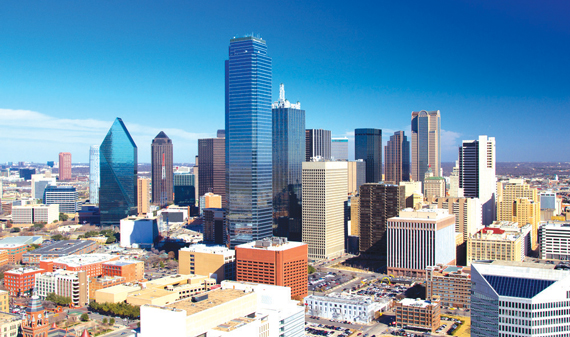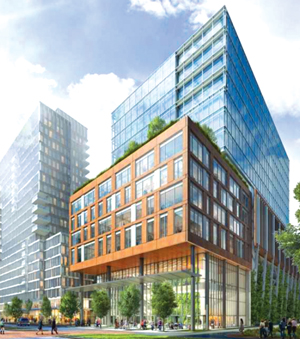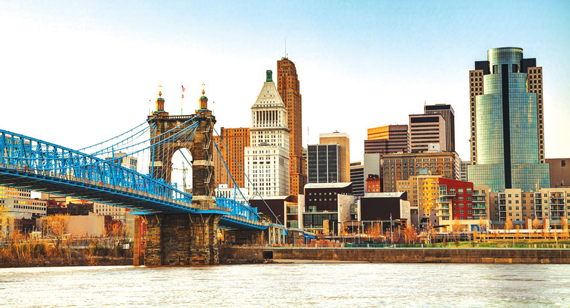Washington D.C.
After half a century, a six-lane trench — the remnants of a failed plan to build an interstate in the nation’s capital — will be filled in with a 2.2 million-square-foot development. The site will eventually become a $1.3 billion complex of apartments, offices, retail and parks, called Capitol Crossing, the New York Times reported. The five-building project, which is being developed by Property Group Partners, will return the three square blocks of the site to Washington, D.C.’s original street grid as envisioned by Pierre L’Enfant in 1791. It will, however, be a complicated undertaking, requiring not only the construction of a vast deck to cover the highway trench but the relocation of a museum of local Jewish history. The 1876 building that the museum occupies once served as Washington’s oldest synagogue and will be moved first to a nearby site, then back to the platform at a cost of $500,000. The developers have also agreed to contribute $9 million toward the new museum. Capitol Crossing has been in the making since 1989 when local developer T. Conrad Monts acquired air rights for the site, envisioning a complex of federal office buildings. Litigation and several changes in ownership followed. Now, the complex’s first office building, 200 Massachusetts Avenue NW, is slated for completion in 2018. “In a project such as this, people don’t believe it until they see it,” said Robert Braunohler, regional vice president for Property Group Partners. “We’ve been talking about it for so long. Now they can see it.”

Downtown Dallas
Dallas
After three decades in the doldrums, downtown Dallas is sailing along nicely, a shift that owes not to one single strategy but many, according to Urban Land Magazine. One of the biggest catalysts, however, was the conversion of historic office buildings to multifamily rentals. In the 1980s, the city’s central business district was drained of vitality by corporations’ relocating their headquarters to suburban office parks, followed by the nationwide crash in commercial property prices of the 1990s. But in recent years, as people began to value the ability to walk or bike to work, developers took note. Forest City Realty Trust, the firm behind Pacific Park in Brooklyn, began a series of office-to-residential conversions, including one involving the landmarked-but-derelict Mercantile National Bank building. It reopened in 2008 as The Merc, a 213-unit rental tower. “We no longer have any older buildings left in downtown anymore,” said John F. Crawford, chief executive officer of Downtown Dallas Inc., a nonprofit advocate for economic development. “They’ve all been converted to residential or some form of adaptive reuse, so we are now moving to
new construction.” Neighborhoods within walking or biking distance from downtown have also seen a flurry of residential construction. Another factor in Dallas’ transformation has been Klyde Warren Park, built atop a below-grade highway, which opened in 2012. After the park was completed, office rents nearby jumped 60 percent, spurring new commercial development. Two office buildings — the 20-story PwC Tower and a 25-story as-yet-unnamed tower at 1900 Pearl Street — are now rising on the park’s northern border. Most symbolically, the concrete pillars of an ill-conceived and unfinished 1980s office tower, dubbed Stonehenge, have been replaced with KPMG Plaza, an 18-story office building completed in 2015.

Kendall Square
Cambridge, Massachusetts
In another sign of the strong Greater Boston area market, Alexandria Real Estate Equities has acquired a nine-building campus in Cambridge for $725 million, the Boston Globe and Boston Business Journal reported. The 2 million-square-foot complex, known as One Kendall Square, consists of offices, laboratories and retail space. The price translates to about $1,125 a square foot, according to the Globe, 84 percent more than the price at which DivcoWest, the seller, acquired the property in 2014. Nevertheless, NYSE-listed Alexandria saw the investment as a bargain. “We are quite confident,” said Thomas Andrews, Alexandria’s executive vice president. “Rents have increased pretty dramatically in the last few years, and we think they’ll continue to go up over time.” The real estate investment trust, which specializes in life-sciences and technology properties, plans to erect a new 172,500-square-foot office building adjacent to the existing 644,771-square-foot campus. With the One Kendall Square acquisition, Alexandria is looking to repeat the success it had with Tech Square, seven buildings the firm owns in partnership with Massachusetts Institute of Technology (MIT), Boston Business Journal reported. The firm controls a portfolio of 6.3 million square feet in the Greater Boston area.

The Cincinnati waterfront
Cincinnati
KAMCO Investment Company, a financial-services firm based in Kuwait, has acquired a 12-story office building in Cincinnati, the Wall Street Journal reported. The $107 million deal, the firm’s largest real estate investment in the United States, is an attempt to diversify KAMCO’s exposure away from the oil industry. The firm acquired the property from its developer, Atlanta-based Carter & Associates. The London-based firm that helped broker the deal, 90 North Real Estate Partners, took a small equity stake. General Electric signed a 15-year lease to be the anchor tenant in the newly erected building two years ago, bestowing the property with the moniker General Electric @ The Banks. The KAMCO deal signals that even as commercial real estate deal volume was down 12.2 percent from a year ago, according to end-of-August data compiled by Real Capital Analytics, foreign investors are prepared to look beyond big cities such as New York, San Francisco and Chicago to smaller markets like Cincinnati in search of higher-yield investments. KAMCO expects an annual income of about 5.5 percent from the office building, people involved in the deal told WSJ. The financing for the deal was structured to be compliant with Islamic law. Compiled by Marynia Kruk
